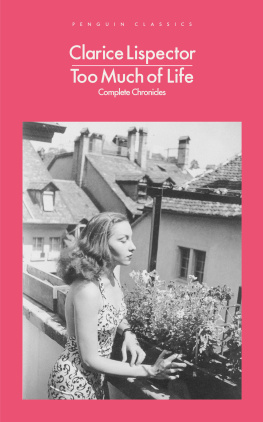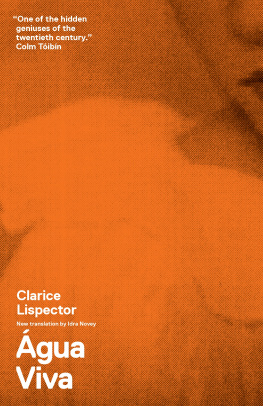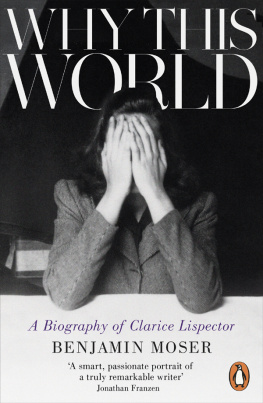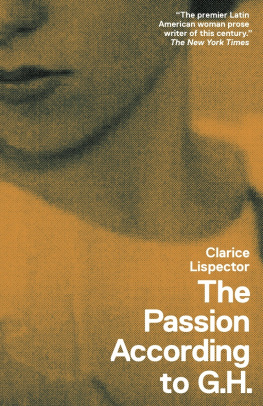Clarice Lispector - The Passion According to G.H.
Here you can read online Clarice Lispector - The Passion According to G.H. full text of the book (entire story) in english for free. Download pdf and epub, get meaning, cover and reviews about this ebook. year: 2010, publisher: University of Minnesota Press, genre: Science fiction. Description of the work, (preface) as well as reviews are available. Best literature library LitArk.com created for fans of good reading and offers a wide selection of genres:
Romance novel
Science fiction
Adventure
Detective
Science
History
Home and family
Prose
Art
Politics
Computer
Non-fiction
Religion
Business
Children
Humor
Choose a favorite category and find really read worthwhile books. Enjoy immersion in the world of imagination, feel the emotions of the characters or learn something new for yourself, make an fascinating discovery.

- Book:The Passion According to G.H.
- Author:
- Publisher:University of Minnesota Press
- Genre:
- Year:2010
- Rating:5 / 5
- Favourites:Add to favourites
- Your mark:
- 100
- 1
- 2
- 3
- 4
- 5
The Passion According to G.H.: summary, description and annotation
We offer to read an annotation, description, summary or preface (depends on what the author of the book "The Passion According to G.H." wrote himself). If you haven't found the necessary information about the book — write in the comments, we will try to find it.
The Passion According to G.H. — read online for free the complete book (whole text) full work
Below is the text of the book, divided by pages. System saving the place of the last page read, allows you to conveniently read the book "The Passion According to G.H." online for free, without having to search again every time where you left off. Put a bookmark, and you can go to the page where you finished reading at any time.
Font size:
Interval:
Bookmark:
The Passion According to G.H.
Clarice Lispector
Translation by
Ronald W. SOUSA
Originally published as A paixao sequndo G.H., copyright 1964 by Clarice Lispector and Heirs of Clarice Lispector. Copyright 1988 by the University of Minnesota
To Potential Readers:
This is a book just like any other book. But I would
be happy if it were read only by people whose outlook is
fully formed. People who know that an approachto
anything whatsoevermust be carried out gradually
and laboriously, that it must traverse even the very
opposite of what is being approached. They and they
alone will, slowly, come to understand that this book
exacts nothing of anyone. Over time, the character G. H.
came to give me, for example, a very difficult
pleasure; but it is called pleasure.
C. L.
A complete life may be one ending in so full identification with the non-self that there is no self to die.
Bernard Berenson
Once Within A Room
Ronald W. Sousa
When a woman known to us simply as G. H. enters a room that "nominally" belongs to her, she experiences the frustrations of many of the expectations normally associated with a room. This room seemingly refuses to play the role of a static container, takes on a living force of its own, and virtually comes to impose itself upon its "owner." As the room expands and contracts, G. H.'s identity is continually undone and remade through the progress of her narration.
As this scenario suggests, the story of G. H. does not fulfill the expectations we commonly bring to a narrative. In effect, it breaks down several of our "containers" or categories that serve to render the world comprehensible.
The most important of those containers, as far as the translator and the reader of The Passion According to G. H. are concerned, are those touching on literary concerns. The fact that the Ukraine-born Clarice Lispector (1924-1977) became a literary cause-clbre in her adopted Brazil but is viewed in France, because of the very same texts, as an important contemporary philosopher dealing with the relationships between language and human (especially female) subjecthood says much about the genre problematic. Are we to take G.H.'s story as fiction or as speculation on philosophical problems in and through the narration of what we would traditionally call a "plot"? Where does literature end and philosophy begin? Intellectually speaking, that question is an easy one to answer: they both end in "language," which for Lispector is the medium within which such designations as "literature" and "philosophy" are made, as well as the medium in and through which alone anything nonlinguistic can be reached. The problem is that for her language is also fallacious unless it is pushed to its limits and thereby made to reveal what, in its structuring as a container, it seeks to hide.
Because of that exploration of language, The Passion According to G. H. comprises a series of nontraditional language usages. It is constituted by segments somewhat but not wholly linearly arranged. They are in fact repetitive, with additions and deletions in each new installmentwith, then, both movement and return; and with every successive movement comes reelaboration of already established issues in radically different ways. The text also comprises: inconsistencies in punctuation practice; juxtaposition of colloquial phrases, poetic phrases, and phrases that are completely non-Portuguese; creation of fictitious allusions; reuse of apparently important terms with slightly changed signification, seemingly to avoid creation of consistent terminology; wholesale, but not therefore meaningless, violations of traditional grammar and syntax, and of the concepts of association and exclusion that underlie them; and employment of complex verbal-conceptual ambiguities. A prominent example of the last of those practices is to be seen in the word "passion," which in Portuguese is the colloquial term for "love" and "lover," in addition to its designation of "passion" as an abstraction and of Christ's Passion. Since it is completely undecidable whether the "the" of the book's title should be translated, that title could just as easily be rendered "Love According to G. H." as it could with the formulation I have given it, which emphasizes the Biblical implications also invoked.
As a translator preparing this singular text for a reading public unable to go to the original, I have felt acutely the ways in which traditional expectations have been violated, for such violation has robbed me of useful ways of structuring my presentation. What I have done as a result is to treat the Portuguese original in quite specific ways. (The original used is the second edition, Rio de Janeiro, Editora Sabia Ltda., 1968; although acknowledgment of the fact is nowhere made, it was substantially revised from the copyright-dated first edition, Rio de Janeiro Editora do Autor, 1964.) I have subordinated the rendition of many of what would traditionally be called "literary devices" to delineation, first and foremost, of the intellectual positions set forth in the book, and only thereafter have I endeavored to reproduce such features as style variation and artful useor violationof language norms. In so doing, I have often made the translated text more conventional than the original, regularly had to paraphrase where no single term was readily available in English, and occasionally had recourse to philosophical terminology where the original uses more ambiguous, and therefore more powerful, formulations. The result is a text that has lost something of the ambiguity and idiosyncrasy that is part and parcel of the original from which it arises and has become more expository in tone than that original. I invite the reader to imagine a Portuguese text that transmits a much greater sense of potential language chaos than does the translation.
This result may or may not be called "translation," but then that undecidability is only fitting in regard to a work that may or may not be called a "novel."
R. S. 1988
The Passion according to G.H .
I keep looking, looking. Trying to understand. Trying to give what I have gone through to someone else, and I don't know who, but I don't want to be alone with that experience. I don't know what to do with it, I'm terrified of that profound disorganization. I'm not sure I even believe in what happened to me. Did something happen, and did I, because I didn't know how to experience it, end up experiencing something else instead? It's that something that I'd like to call disorganization, and then I'd have the confidence to venture forth because I would know where to come back to: to the prior organization. I prefer to call it disorganization because I don't want to ground myself in what I experiencedin that grounding I would lose the world as it was for me before, and I know that I don't have the capacity for another one.
If I go ahead with that grounding and consider myself true, I'll be lost because I won't know where to set up my new way of beingif I go ahead with my fragmentary visions, the whole world will have to change for me to fit into it.
Something's missing that once was essential to me and is so no longer. I don't need it anymore, as though I had lost a third leg that until then kept me from walking but made me a stable tripod. It's that third leg that's now missing. And I've gone back to being someone I never was. I've gone back to having something I never had before: just my two legs. I know that I can walk only when I have two legs. But I sense the irrelevant loss of the third one, and it horrifies me, it was that leg that made me able to find myself, and without even having to look.
Am I disorganized because I have lost something I didn't even need? In this new cowardice of minecowardice is what has happened to me most recently, my greatest adventure, it is so wide a field that only great courage enables me to accept itin my new cowardice, which is like waking up in the morning in a stranger's house, I don't know if I'll have the courage simply to set out. It's hard to lose oneself. So hard that I'll probably soon work out a way of finding myself, even if finding myself is again the lie that I live on. Up to now, finding myself was having a ready-made person-idea and mounting myself inside it: I incarnated myself inside that set-up person and didn't even sense the great construction project that living was. The person-idea that I had came from that third leg of mine, the one that held me fast to the ground. But now... will I be freer?
Next pageFont size:
Interval:
Bookmark:
Similar books «The Passion According to G.H.»
Look at similar books to The Passion According to G.H.. We have selected literature similar in name and meaning in the hope of providing readers with more options to find new, interesting, not yet read works.
Discussion, reviews of the book The Passion According to G.H. and just readers' own opinions. Leave your comments, write what you think about the work, its meaning or the main characters. Specify what exactly you liked and what you didn't like, and why you think so.






